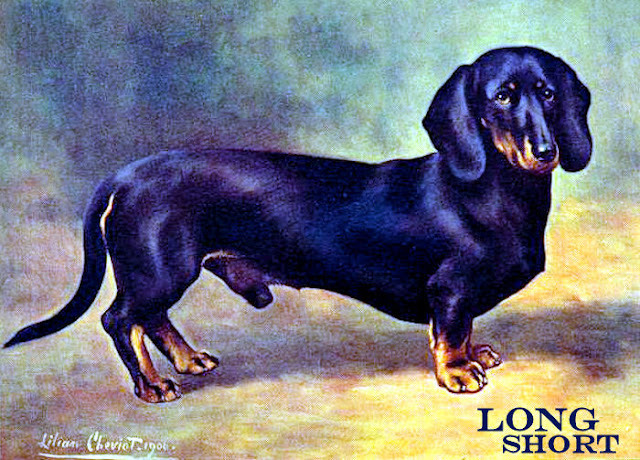Gather 'round Dachshunds. Gather 'round Rusty, go fetch Clancy, find Louie and fetch Pretzel. Come here Fred and Ginger - hurry up now Pee Wee. Where's Zeppelin and Sampson? Get over here and bring Tommy and Bruno. Rudy, Gina, Speckles, Hannah and all! Now sit and pay attention - it's time for Dachshunds in History with Joey and Maggie. Hush sweet puppies - and just listen:
A Wonderful Swim
Via The New York Journal, republished by JOHN H. WALLACE for Wallace's Monthly
February, 1885
Christian Augenschlager, a German immigrant, who arrived at New York in the steamer Westphalia from Hamburg, recently, met with such a startling surprise when he landed at Castle Garden that he fainted dead away, and it is feared that he will have to be sent back to Germany under the law which prohibits the Commissioners of Emigration from receiving insane immigrants.
When Augenschlager went on board the steamer at Hamburg he succeeded in smuggling his favorite Dachshund Blucher into the ship. He had heard that there were foxes in the State of Wisconsin, where he was going, and he wanted his Dachshund to go into the foxes' holes and pull them out.
The body of the Dachshund was fully two and a half feet long, but the length of his legs was not more than six inches. His body was a mixture of black and tan, and his forepaws stood out at right angles with his body.
Everything went well with Augenschlager and his Dachshund until one day the burlesque on the canine species escaped from the steerage, and was soon after found by the cook in the galley, helping himself to a huge piece of meat. Augenschlager missed the dog just in time to run up on deck and see the cook drag Blucher by the tail to the ship's side and hurl him into the middle of the Atlantic Ocean.
Augenschlager had committed an offense in smuggling his Dachshund aboard the ship, and of course had nothing to say. He merely went below and wept.
It was during the forenoon of Thursday, May 21st, that Augenschlager saw his dog thrown overboard. On stepping ashore at Castle Garden Tuesday his attention was at once attracted to a dog that lay curled up and trembling on the corner of the dock, and which looked remarkably like his lost Dachshund.
"Komst du hier, Blucher!" said Augenschlager with a half stifled voice.
The dog responded by creeping up to Augenschlager's feet, for sure enough it was Blucher.
Augenschlager threw up his hands, exclaimed "Mein Lieber Gott! It is Blucher's ghost!" and then swooned. He was cared for by a fellow-passenger, as was also the Dachshund, which had manifested no surprise at all on meeting his master under such strange circumstances. The unfortunate immigrant's talk became very wild and incoherent, and it is thought that he will become permanently insane.
News of the remarkable occurrence spread rapidly, and finally came to the ears of Ernest Picard, who was a passenger in the French steamer Normandie. which had arrived a few hours ahead of the Westphalia.
Picard said that on the afternoon of Thursday, May 21st, the Normandie ran into a whole "school" of icebergs. The weather was foggy and the ship laid to or proceeded under low sail for several hours. While the ship was at a standstill the attention of some of the sailors was attracted to a strange looking animal in the water, which was taken for a seal brought from the Arctic regions by one of the bergs.
The animal swam straight up to the ship's side and a sailor got down and easily pulled it in. The animal was then found to be a German Dachshund, and what seemed strangest of all, he had in his jaws a beef's liver and lungs, commonly called the "pluck."
The Dachshund was Augenschlager's Blucher and the buoyant "pluck" which he had stolen from the galley of the Westphalia had helped him to keep afloat for nearly six hours.
The Normandie, after getting clear of the icebergs, passed the Westphalia, and Blucher was landed at Castle Garden with the rest of the passengers, in advance of those who came in the steamer from Hamburg. He refused to follow Picard, who had "adopted" him, and remained on the dock, as if he expected his old master to arrive in due time.
END
Unrelated Image: a Dachshund named Earl Satin, by Lilian Cheviot, 1906.
The Westphalia





0 komentar:
Posting Komentar